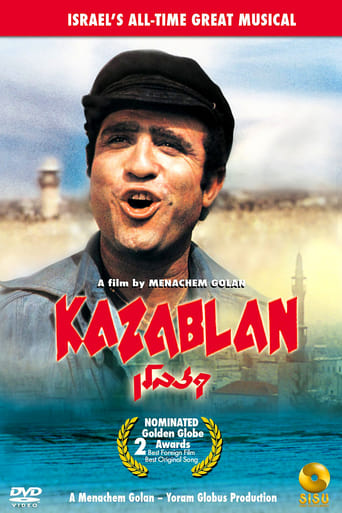hantejudy
This is one of my all time favorite movies. It has great nostalgic appeal since I first saw it in Israel in the 1970's, in the original Hebrew. It is full of colorful characters, singing and dancing, and scenery of parts of Israel (Jaffa, Jerusalem). It is a love story. It deals with real issues in the lives of Israelis in the 1970's and is also funny, totally kitschy, and quotable. Kazablan is great fun to watch if you don't take it seriously. Kazablan (released in 1974) is considered to be in the genre of Israeli films known as "Bourekas" films that is made up of comic melodramas about Israeli life. Bourekas films tend to be escapist and make fun of poverty and the problems between the various ethnic groups of Jews in Israel. Bourekas is a favorite dish of middle eastern cuisine, so the name is a play on "spaghetti" westerns.Yehoram Gaon is adorable and such a gifted singer, watch it just for him.
jls2698
"Kazablan" is, simply put, a film that runs more closely akin to a dream sequence or rapid visual/audio/sensory montage than a linear-constructed primarily plot-driven piece. In some respects, the camera's tendency to wander almost randomly to various individuals, locales, and scenarios somewhat resembles a Monty Python "The Meaning of Life" form. (Although certainly no comparison, beyond the superficial visual image, is being promoted.)To differentiate the quality of performances of the actors is irrelevant in a film with "Kazablan"'s qualities; certainly, the acting is respectable, but the characters are nearly all background to the foreground of the Israeli surroundings' atmosphere. (More specifically, very noticeably 1970's Israel.) In addition, the mood is sustained very well throughout the picture.The intriguing question is simply, What is this film truly about? Is it a coming-of-age story for a young man disenchanted with his post-military service life? Or is it an anti-prejudice statement, albeit a simplistic and superficial one? Ultimately, as discussed earlier, such plot contrivences (to the credit of the filmmakers; they certainly made the correct decision not to overplay certain obvious stances the movie does indeed adopt), are unimportant in "Kazablan."Once again, it is a "mood" film, or a film abundant with atmosphere -- and it should be treated as such. Any attempt to impart a diagectic quality on the part of the viewer is a clear error. ("Kazablan" is not, however, a slice-of-life picture. For an excellent example of such a film [and also to compare the overt differences between a slice-of-life and a mood movie], view "Nobody's Fool," the 1994 piece starring Paul Newman, Melanie Griffith, and Bruce Willis.) Simply watch Kazablan with one objective: Relaxation.
Eugene Kim
When MGM released the English version of this Israeli movie musical in the United States in 1974, I dismissed it back then as an interesting but derivative film that seemed to borrow quite a bit from "West Side Story" and "Fiddler on the Roof." Seeing the Hebrew version of "Kazablan" all these years later (with English subtitles), my opinion of its artistic merits hasn't really changed: the songs are mildly catchy, the choreography uninspired, the plot serviceable. But this time, I found the film's slice of Israeli life much more fascinating. There's a marketplace musical number (shades of "Tradition" from "Fiddler") celebrating the diversity of Israeli Jews. But, as the film makes painfully clear, where there is diversity, there is also bound to be discrimination. (A central conflict of the movie involves differences between Ashkenazi and Sephardi Jews.)Never having been to Israel, I can't say personally whether "Kazablan" accurately depicts Israeli society, past or present. (A friend who used to live there tells me that over the years, what with the growing number of native-born Israelis, the schism between the Ashkenazim and Sephardim isn't as great as it used to be.) But this movie does provide an illuminating inside look for those who think they know what Israel is like solely from watching TV newscasts. It's a pointed reminder that there are many different ways of being Israeli (just as there are many different ways of being American).
